The extraordinary life of a 91-year-old beauty queen
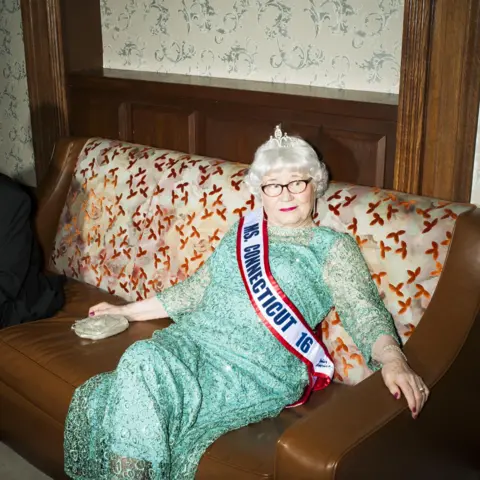 Brian Finke
Brian FinkeKrystyna Farley is a 91-year-old beauty pageant queen in the US state of Connecticut, but her life was not always this glamorous. Although she grew up in a loving home in rural Poland, her childhood was cut short by the outbreak of war. This is her story.
"My skin is beautiful," Krystyna Farley says. "So I don't wear any makeup, just lipstick - that's all."
Krystyna, who will soon turn 92, has spent the last year as the incumbent Ms Connecticut Senior America.
"People think that if you're over 60 you're finished - it's not true," Krystyna says, describing what she likes about beauty pageants.
"You're showing people you are still alive and you still can do it - you can dance, you can sew, you can paint, you can do anything you want."
Krystyna's optimism and joie de vivre is all the more remarkable, bearing in mind the harrowing experiences of her teenage years.
She was born in eastern Poland in 1925, the second of five children. Her family lived on 35 acres of land her father had been given in return for his military service during World War One, in a house surrounded by cherry trees.
"That life was terrific because we didn't have any worries," Krystyna remembers. "We were young and we always had a good time."
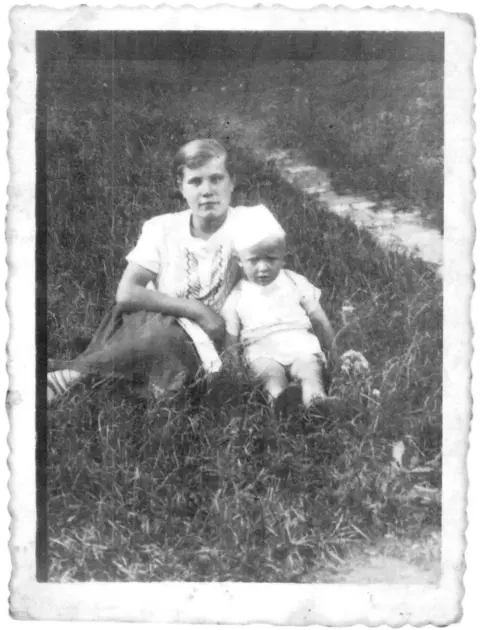 Krystyna Farley
Krystyna FarleyBut when Krystyna was 14 Germany and the Soviet Union invaded Poland - triggering World War Two.
"In 1940 there was a knock on the door," Krystyna says.
Krystyna and her family, like hundreds of thousands of other Polish people, were rounded up on a bitingly cold night by the Russian military and Ukrainian police and bundled into cattle trains for a month-long journey into the frozen forests of the Ural mountains.
"The train had no windows," Krystyna says. "There was a hole for the bathroom and there was a coal stove in the corner, and that was about it. There were about 60 people in each carriage and all we had to eat was bread."
Krystyna's family were put to work harvesting timber in a Russian labour camp on a starvation diet.
"We didn't think about anything else apart from food," Krystyna remembers. "We had nothing to eat, just black bread."
The family spent two dreadful years there, until Germany attacked the Soviet Union on 22 June 1941. Stalin, in need of as many allies as he could find, then suddenly released tens of thousands of Polish prisoners of war, including Krystyna and her family.
Krystyna's father, Andrzej, along with many thousands of others, joined a new army, the Polish Army in Exile. But all of the women and children were left behind and since Hitler had now invaded eastern Poland they couldn't return to their homes.
Krystyna, her mother Walentyna, and siblings squeezed on to a boat full of sick, malnourished deportees and sailed across the Caspian Sea, to find work picking cotton near the Uzbek capital, Tashkent.
There their diet expanded to include flat bread, blackberries, hard cheese and dried melon. But life was still very hard, so Walentyna made the heart-breaking decision to send her children - with the exception of her eldest child, Alice, who was too old - to the safety of the Persian orphanages set up by the Polish Army in Exile.
To reach Iran the children travelled by boat across the Caspian and then joined a convoy of lorries on the journey south to Tehran. They did not know then that they would never see their mother or eldest sister again.
After the dismal conditions they had endured in Russia and Uzbekistan, life in Tehran was much improved. There were clean beds and there was plenty of food - but Krystyna fell terribly ill.
Believed to be dead, her body was sent to the mortuary, where only by chance a nurse saw Krystyna move and realised that she was still alive.
"I had pneumonia in two sides of my lungs," Krystyna says. "I was half dead, so I don't remember too much in Tehran."
When she recovered, Krystyna arranged for her brothers, Teddy and Chester, to join the cadets and sent sister, Natalie, who was just eight, to an orphanage in Africa. Then she enlisted in the Polish Army in Exile.
"I wanted to be in the army to drive a car," she explains. "That was my own stupidity - you see if you're young, you're stupid."
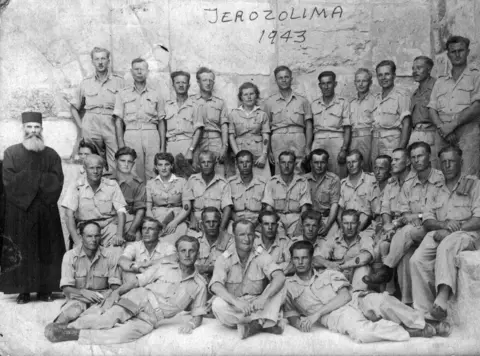 Krystyna Farley
Krystyna FarleyKrystyna was about to turn 18, but lied about her age, as 19 was the minimum age to join the army. However, she wasn't selected to become a military driver, and instead was sent to train as a nurse's aide in Iraq.
Krystyna's five years of military service - for which she received a King George medal - took her to Egypt, and then to Iraq, where she was reunited with her father. Later they were both stationed in Jerusalem together.
"That was a very nice feeling, but you see, if you're young you really just think about food and money, not family," Krystyna admits.
"So I came to my father and I just said, 'Pops, do you have some money?' And I looked in his pocket and he had plenty, so I took some because we just wanted to buy ourselves makeup and stuff like that."
Krystyna and her father were among the troops who crossed the Mediterranean under constant threat from Nazi bombers to join the battle at the hilltop monastery of Monte Cassino, south of Rome.
While patching up the injured and mutilated soldiers coming off the mountain Krystyna met a man who was to become her first husband - a soldier called Stanley Slowikowski - who was sent to her ward with a leg injury.
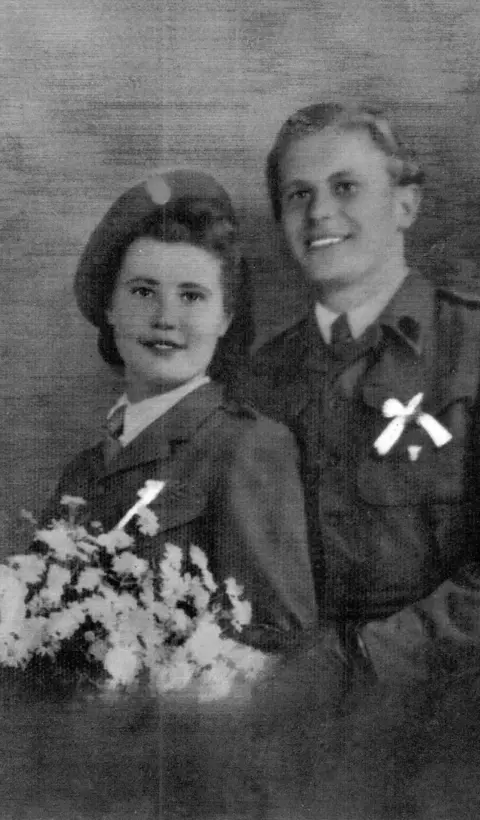 Krystyna Farley
Krystyna FarleyWhen the war ended Krystyna and Stanley settled in England, and it was here that Krystyna's family were all finally reunited - her father, brothers and younger sister.
Krystyna later learned that her mother had died from malaria. Nothing was ever heard of her elder sister, Alice, who had also stayed behind in Uzbekistan.
"I think my sister is still alive, if she's healthy like I am," Krystyna says.
Krystyna and Stanley had three children together but Stanley drank heavily, possibly as a result of his experiences in the war, and Krystyna was widowed in 1949, leaving her with three young children and very little money.
She began to teach children the dances that she had learned as a child, and in 1953 her dance troupe was invited to perform at the coronation of Queen Elizabeth, wearing costumes that Krystyna had designed and made.
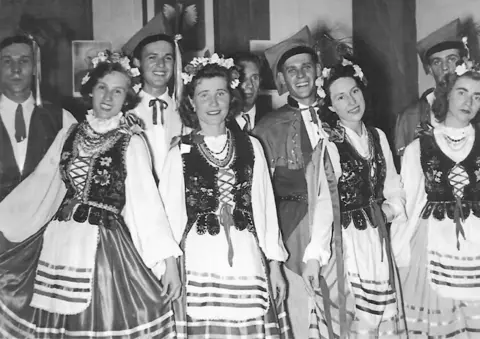 Krystyna Farley
Krystyna FarleyBefore she left the UK, Krystyna had another child, Elizabeth. The father had proposed marriage, but she wasn't ready to marry again, and says that a sense of curiosity took her to the US, where she arrived in 1955 with a fur coat on her back, a few hundred dollars in her pocket and four young children by her side.
There Krystyna built a new life for herself and her children, working for many years as a dental hygienist.
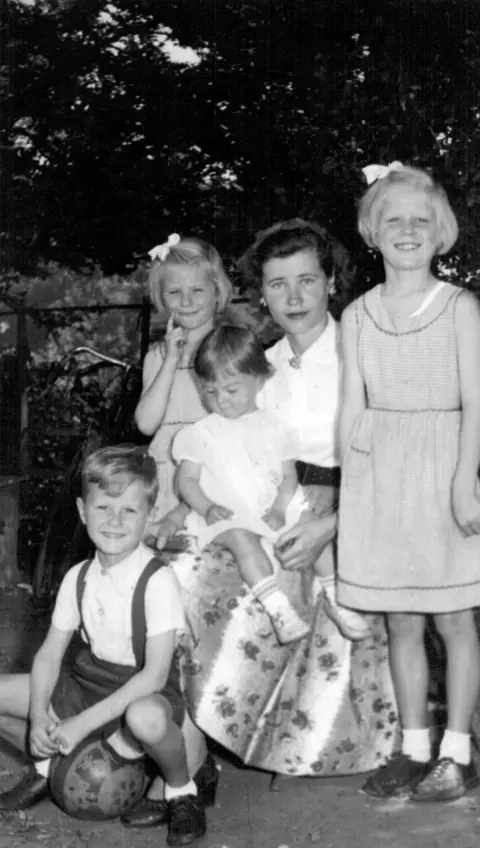 Krystyna Farley
Krystyna FarleyShe remarried in 1956 and had another daughter, named Eva.
It wasn't until she was in her late 50s, though, that Krystyna met the man who she describes as the love of her life, Ed Farley. They married in 1979 and have been inseparable ever since.
Krystyna is very active in the Polish community in Connecticut.
"I joined all kinds of clubs," she says. "I was teaching children Polish folk dances, and I took groups to Poland to the international dance festival."
But late in life she also embraced the very American tradition of beauty pageants, entering the Ms Connecticut Senior America competition for the first time at the age of 70.
That time she was second runner-up. At her next attempt, a few years later, she was first runner-up. At her third attempt, in 2016, she was crowned queen.
"You have to have a regular dress, you have to have a talent, then you have a gown, and you have to talk about your philosophy of life," Krystyna explains.
"I have three or four different talents - I can read poetry, I can dance, I can do Carmen Miranda," she says, referring to the singer famous for Chica Chica Boom Chic.
"And my philosophy of life is to love everybody and be good to everybody."
She adds: "You have to love people and be with people, because if you don't have people around you, you're a dead pigeon."
In last year's Ms Senior America finals, Krystyna competed against 44 other state queens - and lost to a woman roughly 30 years her junior.
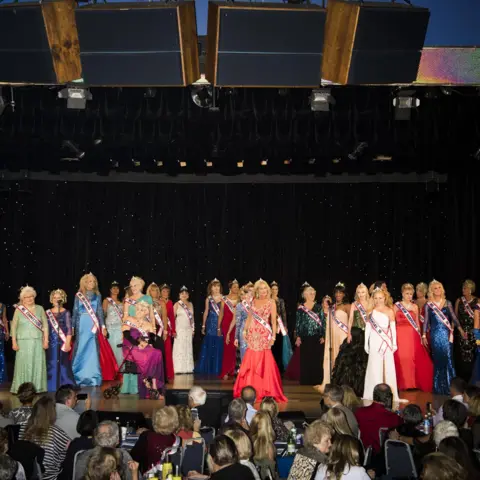 Brian Finke
Brian FinkeShe handed on her Ms Senior Connecticut crown to 2017's queen back in May and, with her 92nd birthday approaching on 19 August, she says now may be the time to hang up her tiara for good.
"No more pageants for me," she says.
But with nine grandchildren, four great-grandchildren and a fifth on the way, she still has plenty to keep her busy.
"Right now I'm dressed, I have earrings on - I'm always ready for something to happen," Krystyna says.
"Sure, nothing is happening, but I'm always ready."
Listen to Krystyna Farley talking about her philosophy of life on Outlook, on the BBC World Service

